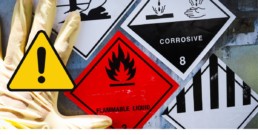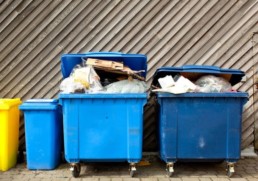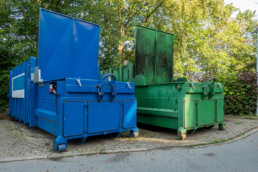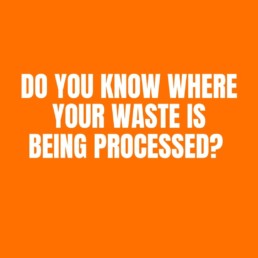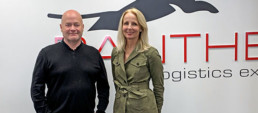The dangers of hazardous waste and how to do it safely
Introduction
Hazardous wastes are those which are dangerous and difficult to handle. If your business produces hazardous waste you have a duty of care to make sure it is disposed of properly.
Proper disposal of hazardous waste is crucial for the safety of people, animals, and the environment. Hazardous waste, if not handled correctly, can lead to severe health risks, contamination of soil and water, and dangerous chemical reactions. This document provides an in-depth understanding of the dangers associated with hazardous waste and offers guidelines on how to dispose of it safely.
The Dangers of Hazardous Waste
Hazardous waste encompasses many materials that pose significant risks due to their chemical composition, flammability, reactivity, or toxicity. Below are some of the primary dangers associated with hazardous waste:
Health Risks
- Exposure to Toxic Substances: Direct contact with hazardous waste can result in skin burns, respiratory problems, and poisoning. Many hazardous materials can be absorbed through the skin or inhaled, leading to serious health issues.
- Long-term Health Effects: Repeated exposure to certain hazardous materials, such as asbestos or heavy metals, can lead to chronic illnesses, including cancer, neurological disorders, and reproductive issues.
Environmental Impact
- Soil and Water Contamination: Hazardous waste can seep into the soil and groundwater, contaminating drinking water sources and agricultural land. This contamination can persist for years, affecting ecosystems and human health.
- Air Pollution: Improper disposal methods, such as incineration without appropriate controls, can release toxic fumes and particles into the air, contributing to air pollution and respiratory ailments.
Fire and Explosion Hazards
- Flammable Materials: Certain hazardous wastes, such as solvents and chemicals, are highly flammable and can easily ignite, causing fires and explosions that put lives and property at risk.
- Reactive Substances: Some hazardous materials can react violently with other substances, leading to dangerous situations that can result in explosions or release toxic gases.
How to Dispose of Hazardous Waste Safely
Safe disposal of hazardous waste requires adherence to specific regulations and best practices. Below are the key steps to ensure the safe handling and disposal of hazardous materials in commercial settings:
Identify Hazardous Waste
Properly identifying hazardous waste is the first step in ensuring its safe disposal. This involves:
- Labeling and Segregation: Label all hazardous materials and segregate them from non-hazardous waste. This helps prevent accidental mixing and ensures that each type of waste is handled appropriately.
- Understand hazardous materials, their properties, risks, and safe handling procedures.
- Further guidance for workplace health and safety can be found at The Health and Safety Executive (HSE).
Use of Appropriate Containers
The containers used for storing and transporting hazardous waste must be suitable for the specific type of waste, following all relevant regulations for proper storage and disposal. Key considerations include:
- Durability: Use durable containers that are resistant to the chemicals they will hold. This prevents leaks and spills.
- Sealing: Ensure containers are properly sealed and labelled to prevent the release of hazardous substances.
Compliance with Regulations
Adherence to regulations is essential for the safe disposal of hazardous waste:
- These regulations apply to those who produce, broker/deal, carry and receive hazardous waste to keep, treat or dispose of. Hazardous waste must be accompanied by correctly completed paperwork called a consignment note, or hazardous waste consignment note (HWCN). The note must be prepared before any hazardous waste is moved and is required for all movements of hazardous waste.
- Record-Keeping: Maintain accurate records of the types and quantities of hazardous waste generated, as well as the disposal methods used. These ensure the traceability of the waste from origin to disposal.
Training and Education
Educating employees about the dangers of hazardous waste and proper disposal methods is crucial for maintaining a safe work environment. Training programs should cover:
- Hazard Identification: Teach employees how to identify hazardous materials and understand their risks.
- Emergency Procedures: Train employees on emergency procedures in case of spills, leaks, or exposure to hazardous substances.
Working with Footprint Recycling
Working with a professional waste management company will ensure that hazardous waste is disposed of safely and in compliance with regulations. We have the expertise to handle hazardous waste safely and will ensure you have the right equipment for safely transporting, treating, and disposing of hazardous materials.
All businesses have a responsibility to dispose of hazardous waste safely. By understanding the dangers of hazardous waste and following best practices for its disposal, businesses can protect their employees, the public, and the environment. Proper identification, appropriate containers, regulatory compliance, professional waste management services, and employee training are all essential components of a comprehensive hazardous waste management strategy.
Call us on 01484 660770 or email our team if you'd like to find out more.
INTRODUCING THE NEW 2025 MANDATORY WASTE LEGISLATION IN ENGLAND
In October 2023, the UK Government introduced new Simpler Recycling legislation as part of the Environment Act 2021 to improve waste collection and recycling in England.
The new legislation aims to clarify what materials can be recycled, standardise recycling practices at home, work, and school, reduce landfill waste, tackle illegal waste disposal, and increase recycling rates.
As part of the Simpler Recycling legislation, delivery timelines have been set:
- 31 March 2025 - Non-households
Businesses (more than ten employees) need to separate dry recyclables and food waste. - 31 March 2026 - Households
Local authorities must collect all dry recyclable materials and separate weekly food waste collections (which can be combined with garden waste) - 31st March 2027 - Households and non-households
Inclusion of plastic film packaging and plastic bags in the plastic waste stream - 31st March 2027 - Micro-businesses
Businesses with fewer than ten employees must recycle all specified waste streams.
From the end of March 2025
Businesses with ten or more employees must separate dry recyclables into specific containers and arrange food collection separately.
What does this mean for your business?
All mixed recycling, including cardboard, plastics, glass, and metal, should be carefully separated and disposed of in accordance with the new guidelines to ensure that each material is recycled appropriately and to minimise environmental impact.
If a business produces more than 5kg of food waste per week, it must arrange a separate collection by licensed waste carriers. This includes biodegradable materials from processing or preparing food, such as inedible parts like bones, eggshells, fruit and vegetable skins, tea bags, and coffee grounds. The new legislation excludes micro-businesses (businesses with fewer than ten full-time equivalent employees).
According to the official government response, food waste collected must undergo anaerobic digestion treatment. This process generates biofuel, which can be used for energy, while digestate is a nutrient-rich substance produced by anaerobic digestion that can be used as a fertiliser, helping to form a circular economy.
To comply with the new legislation, your business must implement the new waste requirements, including storage and collection processes, by 31 March 2025. Businesses that fail to comply with the new regulations will face fines, enforcement actions, and potentially prosecution.
Compliance ensures that your business will avoid financial penalties, demonstrate corporate responsibility, and improve sustainability credentials. It’s also an opportunity to review your services and save costs.
How can Footprint Recycling help?
- Footprint Recycling will conduct a thorough waste audit, evaluating your current processes, staff awareness, equipment, sustainability, waste streams, volumes, service frequency, bin types, and costs.
- We will ensure compliance with new regulations and identify the best solutions for your business. We will help establish suitable systems to maintain compliance and prevent business disruptions.
- Our team will provide training to ensure employees understand the importance of new practices and know how to separate food waste correctly.
- We will provide food waste collection services and arrange appropriate collection schedules.
- We can assist you in achieving significant cost savings by reducing general waste volume and the associated costs of waste removal and recycling.
- We will generate reports that showcase your sustainability efforts, demonstrating your dedication to reducing environmental impact.
- We will support your efforts to comply with regulations, enhance your company’s brand reputation, particularly among environmentally conscious consumers and investors, and explore partnerships with local charities to donate surplus food.
By embracing these innovations, businesses can comply with regulations and turn food waste management into a competitive advantage.
Get in touch to discuss your requirements.
Starting from 6th April 2024, new regulations will be introduced in Wales that will require all non-domestic premises, such as businesses, charities, public sectors, and those who collect, keep, treat, or transport waste from non-domestic premises, to separate key recyclable materials.
Non-domestic premises must separate and present nine specified recyclable waste materials in a minimum of six separate recyclable waste streams. These materials are:
- glass
- cartons and similar, metal and plastic
- paper and card
- food waste from premises that produce 5 kilograms or more of food waste in seven consecutive days
- unsold small waste electrical and electronic equipment
- unsold textiles
Bans will also be in place from 6th April 2024, on the disposal of food waste to sewer from non-domestic premises, specified separate recyclable waste streams going to incineration plants and landfills, and all wood waste going to landfill.
These changes to the law aim to help the country work towards becoming a zero-waste nation and reducing carbon emissions by 2050. Separating and sorting recycling in workplaces should ensure greater volumes of high-quality recycling are produced and much less waste sent to landfill and for incineration.
Failure to comply with the separation requirements will be considered an offence, and there will be no upper limit on the courts' power to fine. Instead of criminal prosecution, a civil sanction may be issued for non-compliance with the separation requirements.
While we have a legal responsibility under the Environmental Protection Act 1990 'duty of care', should England adopt these more stringent regulations regarding separation of recyclable waste in order to achieve a greener future and promote sustainability? Many organisations in England currently do not have a waste strategy in place and do not separate recyclable waste from non-recyclable. However, commercial recycling plays a crucial role in ensuring sustainability. It is important for businesses to actively participate in these efforts.
For more detailed information about the Waste Separation Requirements (Wales) Regulations 2023, please refer to the Welsh Government code of practice. If you're a business and are looking to adopt a waste and recycling strategy get in touch.
International Women’s Day - Invest in Women: Accelerate Progress
Robyn Brook and Clare Verity are the founders of Footprint Recycling. Here, they share their experience as women in waste and the critical role women play in the industry.
Clare:
“Prior to establishing Footprint Recycling, I was employed in the waste management sector, where I found my job to be personally fulfilling and environmentally rewarding. During my pregnancy with my second child, I was motivated to utilise my expertise and passion for the industry to start my own business. That’s when my business partner, Robyn, and I founded Footprint Recycling 16 years ago.
“As a female-owned business in a male-dominated industry, we understand the importance of supporting and empowering our younger colleagues as they develop their careers. This year’s International Women’s Day theme, “Invest in Women: Accelerate Progress,” serves as a reminder to provide equal opportunities for education, training, and professional development to women in waste. Through our efforts, we aim to promote gender equality and help women achieve their full potential in the industry and make positive changes.”
Robyn:
“Over the years, it’s been great to see more women join the waste and recycling industry and I am proud of the fact that Footprint was founded by women and women make up many of the key roles within our organisation. It’s a testament to the progress made since we began our journey. International Women’s Day is an excellent opportunity to acknowledge and celebrate this, and the valuable contributions women are making across all areas of the waste industry.
“At Footprint, one of our core values is ‘respect’. We live by this. It is the bedrock of everything we do, and we feel strongly that celebrating gender diversity is important. It fosters a more inclusive workplace and brings a variety of perspectives and experiences to the table, promoting better problem-solving, decision-making, and, ultimately, success for our business.
“I am inspired by our team and of what Clare and I have accomplished for women and diversity in waste.”
Women’s roles are essential to our industry’s success, especially with the growing shift towards viewing waste as a resource. The industry is moving away from traditional landfill practices and towards waste prevention and a circular economy. Women have seen the industry’s huge potential, and through their assertiveness and progressive attitude, women can help shape the industry’s future towards a more efficient and sustainable future.
If you’d like to work with Footprint Recycling, get in touch for an informal chat.
Responding to the needs of our customers
We recently had a conversation with one of our customers and gained valuable insights about the benefits of working with Footprint Recycling. It was such an inspiring story we shared it across our channels and we received a comment about the importance of reviewing where the waste was being processed and ensuring it was being processed effectively. This is absolutely right.
All businesses need to consider where their waste is processed as part of their waste journey as when it comes to reducing waste and promoting sustainability, businesses have a significant role to play.
At Footprint, we believe that a comprehensive waste journey analysis is the first step towards achieving this goal. We work closely with our customers to assess their waste production and identify areas where they can reduce, recycle, reuse, and repurpose waste.
We then assist them in implementing these changes while ensuring that they comply with all legal requirements. We understand that monitoring and reporting are critical components of any waste management process. That's why we provide our customers with regular updates on their waste journey process, including data on waste generation, recycling rates, disposal methods and outcomes. This information helps them to evaluate their progress and identify areas for further improvement.
We believe that a zero-waste approach is the way forward, and we encourage our customers to adopt this mindset. By eliminating waste from their production processes and finding innovative ways to repurpose and reuse materials, businesses can significantly reduce their environmental impact while saving money.
In conclusion, our comprehensive waste reduction process is designed to guide businesses towards sustainability and zero-waste practices. We believe that by working together, we can make a real difference and build a better future for generations to come.
Clinical Waste Regulations
Clinical waste can be hazardous or harmful and cannot be disposed of in regular waste receptacles, general waste bins, skips or recyclate bins. It is commonly produced in hospitals, labs, and clinics but can also be produced in other types of businesses or homes. It could be anything from human or animal tissue, to drugs or medicines, pharmaceutical products, needles or syringes (and other sharp objects), swabs or dressings.
All businesses have a legal responsibility to dispose of clinical waste safely, and it is part of the statutory duty of employers under the Health and Safety at Work Act (HSWA), Control of Substances Hazardous to Health (COSHH) and Hazardous Waste regulations made under the Environmental Protection Act.
The safe disposal of clinical waste must be managed in line with several other regulations which relate to the storage, collection and disposal of clinical waste. An extensive, but though exhaustive, list of the legislation and regulations includes:
- Controlled Waste Regulations 2012
- The Waste (England and Wales) Regulations 2011
- Hazardous Waste Directive 2011
- Carriage Of Dangerous Goods Regulations 2009
- Hazardous Waste Regulations 2005
- List of Wastes Regulations 2005
- Environmental Protection (Duty of Care) Regulations 2003
- COSHH Regulations 2002
- The Environmental Protection Act 1990
Breach of the regulations by an employer or employee is a crime, punishable by summary conviction or on indictment by an unlimited fine.
So what is clinical waste?
Clinical waste can pose a risk of infection when handled. There are many different types of clinical waste, each requiring special care in its disposal. Understanding clinical waste can help you dispose of it correctly and prevent contamination, the main categories for clinical waste are:
- Infectious waste containing pathogens
- Pharmaceutical waste
- Pathological waste containing human tissue or fluid
- Chemical waste
- Sharp wastes
- Radioactive waste
- Pressurised containers
- High heavy metal content
Understanding the importance of proper clinical waste management is essential for any business with the above waste. We offer professional services that ensure complete compliance with UK regulations, whether it’s advice, collection, treatment, or disposal, we’re here to help you at every step. We can take care of all the paperwork related to our collections, which means you can have the documentation you need to prove your compliance with UK waste regulations.
Contact us today for a free, no-obligation quote on our expert waste management services. We’re always happy to help!
2023 New Regulations around Persistent Organic Pollutants (POPs)
From 1st January 2023 new legislation from the Environment Agency came into effect regarding the storage and disposal of waste upholstered domestic seating containing Persistent Organic Pollutants (POPs).
From this date, upholstered furniture containing POPs cannot be safely disposed of in general waste or in landfill sites and should be treated as a separate waste stream. This means that these items must be safely disposed of through incineration.
POPs are poisonous chemical substances that remain intact in the environment for long periods and are harmful to the environment, wildlife and humans if they are not disposed of safely.
Investigative work carried out by The Environment Agency has identified quantities of POPs and other hazardous chemicals in the foam of upholstered seating.
Upholstered waste domestic seating examples, this includes any part made of or containing leather, synthetic leather, other fabric, or foam:
- Sofas
- Sofa beds
- Armchairs
- Kitchen and dining room chairs
- Stools and foot stools
- Home office chairs
- Futons
- Bean bags, floor and sofa cushions
The following items of domestic seating are unlikely to contain POPs:
- Items that are not upholstered, without cushions.
- Deckchairs
- Wastes from manufacturing new domestic seating (and the manufacturer can demonstrate do not to contain POPs)
- Mattresses, curtains, blinds and beds are not domestic seating and are not covered by this guidance.
POPs may also be found in waste electrical and electronic equipment (WEEE), this may include:
- Office equipment – non-household types such as photocopiers and printers
- Printed circuit boards
- Cables and granulated cable plastics
- Plastic cases from display devices (flat panel displays and cathode ray tubes)
For more details on WEEE that may contain POPs please visit the .gov website for further details.
Customers must inform us if they have any upholstered furniture containing POPs so we can arrange safe and legal collection. Please note we are no longer able to collect any of these items if they are left outside as part of your general or other waste.
For further information about the new regulations, visit .gov.
PANTHER PARTNERS WITH FOOTPRINT RECYCLING TO TAKE SUSTAINABILITY PLEDGE TO THE NEXT LEVEL
Leading two-person white glove delivery specialist Panther Group has joined forces with total waste management firm Footprint Recycling to help them reduce their carbon footprint, taking them a step closer to achieving their Net Zero pledge.
In recent years, as a part of its ESG pledge, Panther has vastly increased its commitment to improving its environmental impact by keeping its waste unpolluted and to a minimum by following best practices. They have increased recycling measures, conserved energy more efficiently, and used environmentally friendly technologies.
To take its commitment one step further, the business has even set a target to implement a zero-waste culture throughout every aspect of its operations.
Having provided a comprehensive range of sustainable waste and recycling solutions to a wide range of sectors since 2008, Footprint Recycling is passionate about helping businesses manage their waste, reduce their carbon footprints and achieve their sustainability goals.
Since partnering with recycling specialist Footprint, Panther has greatly improved their recycling and environmental credentials. To date this year alone, Panther has recycled more than 453 tonnes of cardboard, plastic, and expanded polystyrene, 226 tonnes of general waste, 144 tonnes of TVs, and over 50,000 old mattresses collected and recycled on behalf of its customers and 25,000 tonnes of metal from washing machine bodies also recycled. The company’s carbon footprint by installing energy-efficient LED lighting throughout the depots has also improved by 60%.
And ever mindful of the need to provide a ‘green’ ethical service, Panther provides a furniture recycling service and closely adheres to the WEEE Directive.
Panther can now boast that 80 percent of its waste is recycled – with an aim to increase that figure to 90 percent over the next 12 months.
As part of its long-term sustainable energy programme the company is collaborating with Ev3power and is considering solar, wind turbine, and hydrogen options to power its operations and are also considering electric and hydrogen options for its fleet.
In recent weeks Panther has conducted a number of electric vehicle trials and now boasts a forklift fleet that is 60 percent electric.
Guy Burgess, Logistics Director commented: “With combatting climate change currently at the forefront of the global agenda, we have chosen to partner with Footprint Recycling to further improve our environmental impact and make a positive difference to our ecosystem.
“As a business, we are already making huge strides in making long-term and sustainable changes by pushing sustainability in every aspect of the business. Ingraining environmental consciousness within the company’s culture and Footprint Recycling will be a fundamental driver in helping us to facilitate this.
“No longer is it acceptable for companies to provide a 'sustainability statement' as consumers are far savvier and more discerning about how they spend their money and what businesses they’re willing to support and trade with.
“More than that though it’s vital that as a growing business we respond to the current climate crisis and act accordingly. The government has set a pledge for the UK to achieve Net Zero status by 2050, and as a company that strives for sustainability, we want to join the fight against global warming by driving down our environmental impact over the coming years.”
Robyn Brook, Founder & Chief Executive Officer, Footprint Recycling commented: “Our business is built on a foundation of helping our customers embrace the circular economy and improve their sustainability with a focus on achieving zero waste to landfill through recycling and reducing emissions.
“With pressure on businesses, like Panther, to do more to minimise their environmental impacts, our aim is not only to manage waste but to challenge the industry norms by developing processes bespoke to each client and introducing new ways to reduce, reuse and recycle.
“We’ve been working with Panther for several years, over which we have developed a fantastic relationship that allows us to continually strive and look at new ways to help them improve their environmental credentials and assist with their sustainability journey.”
The beginning of a new era for Footprint Recycling
It's the beginning of a new era for Footprint Waste Management as we launch our new brand identity, company positioning, and, soon, a new website.
Our new brand represents our continued commitment and investment in our company. We have seen significant growth over the past few years, a growing team and new major contract wins. We've also expanded our service offering, which now includes Carbon Neutral, complementing our existing offering of complete waste management and recycling.
As we develop and expand, everything we do still revolves around our experiences and customers. The new brand represents our simple company ethos of providing services to promote a circular economy - Waste Management - Recycling - Carbon Neutral.
Robyn Brook, Director, said: "Our business has gone from strength to strength but we couldn’t have done it without our fantastic customers and staff. I thank you all for believing in us and I thank our wonderful team who make every day possible. Clare and I are inspired (and regularly saved!) by you all.
"Our waste management vision is simple, to be the best and never give up. We started Footprint because we believed we could do better, be faster, more creative, find a better solution, make our clients more money, save them money, be useful, be supportive, be honest, think outside the box, add value to their business by understanding their business, offer the best waste solution and results for sustainability, find the ‘how can’.
"We review, we learn, we set targets, we train, we drive, we track, we deliver results then we review and re-set the goal posts.
"We want to grow our business and our network and we want to learn more. We have many customers who we’ve helped to reach 97%-98% recyclability with as much of that as possible going to re-use.
The new brand represents where we stand as a company today; it's a simple formula, but we feel it's the perfect fit for us, it unifies our services, and it was necessary to reflect and establish ourselves now and in the future."
If you'd like to chat to us about your current waste management, recycling, or reducing your carbon emissions, give us a call on 01484 660770 or drop us an email, and we will give you a call.

